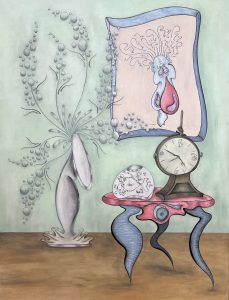I sense the pendulum must swing back.
We are experiencing a flood of emotional persons insisting conditions and ideas are true without any factual, empirical, basis.
Our society, I argue, is sick of truth.
Before you swipe or move on to the next article about how to improve your relationship or how to fix your resume or 16 ways to roast kale, wait. Hear me out. I’m not about to say what you think — feel — that I’m about to say.
Without debating moral subjectivism, objectivism, or relativism, and with a stance of provisionalism (I think I’m right, but am open to discussion — and I like words that end in “ISM”), I offer the following theory.
As a society, we have spent some time (since the late 17th century) trying to find — to live by — truth. An honorable pursuit, to be sure. Truth cures disease. Truth provides economic benefit. Truth brought us technological advances philosophers like René Descartes could never have imagined while writing a treatise by candlelight.
But that pursuit of truth comes with a price.
While splitting atoms, killing cancer, evolving from a gas-powered engine, we have set emotions aside. We try to discover the chemistry of depression, of abuse, of greed. What chemical can empirically cure these ills? Yet, by avoiding emotions and desires and dreams — and illusions — we have given the madman, the creative, the extremist, the eccentric — no route but to insist their dream is a fact. Their fantasy must have an empiracle basis. And what we have forced, as a society, is a world full of people insisting gut feelings, proclivities, and imaginary visions are fact because they are experienced.
The proponents offer no fact. No empiric evidence. No clear definition. They offer an assertion: I feel it. It’s true.
Descartes did not say, “I feel, therefore it’s true.”
Last week, one of my students who is so immersed in this emotional reasoning she is blind to any instruction at all, argued that students, like employees, should have sick days. Her evidence? “I had kidney stones, and I was sick for a few weeks, and my professors would not give me the time off.”
Okay. Well, that’s personal experience. And she could have read in the text (which I wrote, so I know what it says), that personal experience or anecdote, or personal opinion, is only reliable if it is backed by empirical and objective facts and expert opinion. If it is reliably and consistently corroborated.
Her adversary offered evidence: Federal and state law that secures sick time (family medical leave) for employees. She discussed the purpose behind those laws. She then differentiated between the definition and role of employee and the definition and role of student. She also provided evidence from several universities of programs that permitted leaves of absence without penalty — or status letters from the school counseling center or school medical center that provided accommodation for illness. She supported her argument with, you know, facts.
In determining who won the debate, one-third of the class agreed with the proponent because “it’s fair.” I’m sure none of them even heard the other woman’s argument because it hurt their feelings. Feelings have become facts. I believe — I feel — that I’m a unicorn, so I am. I feel like a princess, so I am.
And I, personally, am struggling with what I see as a reactive pendulum swing by emotional, and often, illogical people who are desperate for society to feel something. Honestly, is it not this society that birthed online flaming? Bullying? Criticism? Intolerance for religion? (Oh, wait, no that one is ancient.) Sure, we have amazing cell phones and self-driving cars, but does embracing objective fact result in cold, hard, brutal, negation of the heart?
The Enlightenment ushered in the modem era with scientific and reason-oriented viewpoints. Modernists, “rejecting the Christian idea of … inherent sinfulness,…held that the individual was basically good, and that evil resulted from faulty institutions, poor education, and bad leadership” One cannot deny the technological, political, scientific and communication advances modern, reason-oriented humans have made. One also cannot fail to see the inevitable questions and problems realistic modernism creates and the eventual backlash reaction humans are bound to take.
To illustrate, I return to an earlier time. A simpler time for me.
The mid 1990s, when my very realistic and analytical son, Kyle, upon viewing store shelves loaded with Easter candy and baskets, and toys, correctly concluded “mommy is the Easter Bunny.” I did not deny this conclusion and congratulated him on his evaluation of the empirical evidence. Easter morning, however, he retold the story of this enlightenment, excited at his brilliance, at his insight. But he hesitated: “Now, wait a minute. If the Easter Bunny isn’t real, then…”
Tears welled in his eyes and he sat quietly picking at a small chocolate foil-wrapped egg and I waited for the inevitable logical conclusion which would scar all my future Christmases until I had grandchildren. Suddenly, he smiled and said, “But Santa is human and has all those flying reindeer.” He continued to eat his candy as I sighed my relief.
Kyle reached a conclusion he was not ready or able to live with and, therefore, denied his extrapolated conclusion. Whether it is the need to find a conclusion to the unknown or the undying romantic and need for pleasure, humans continually bend back towards illusion and fantasy. Humans will only go so far with reason and fact — and then inevitably fall back into this folkish comfort. We want to continue to eat our candy.
Sometimes it just tastes so good.
We call this lovely and painful human experience cognitive dissonance: When a person attempts to hold conflicting ideas in the mind and experiences pain, knowing both cannot be true. As one of the characteristics of the human condition, this bias is absolute anguish.
IN THE MIRE…
Scientifically, animals have two categories of gonads. That’s an anatomical fact. But science is revealing additional facts that gender is fluid and does not always align with the birth gonads (sex).
Even more importantly: Gender feelings are real. The feelings are true.
Although a person is born with a penis, that person feels like a girl. In fact, that person’s brain chemistry may dictate those feelings. That experience. And that person suffers painful dissonance: gender dysphoria. That person can resolve that dissonance by denying or negating the feelings, trying to align both experiences as true, surgically altering the body… a list of coping routes. I have watched this painful experience in five people I love.
I don’t know what I think. I don’t know what’s true. I need cold, hard, Enlightenment facts. And I don’t know what to say. And I wonder what I fear.
The Enlightenment pushed forward until people felt unsafe and unsure. Wordsworth’s accusation to realist that his “heart is dead” seems to illustrate this feeling of emptiness in realism. Suddenly, there was industrialization and cities and mixing of cultures and capitalism. Then there was Freud and Darwin and the concept that people were just animals and molecules whose emotions and actions were as chemically controlled as nuclear explosions. The spirit seemed destroyed.
God is dead, and we killed him.
In Archibald MacLeish’s poem, Dr. Sigmund Freud Discovers the Sea Shell, MacLeish suggests science’s “religion is to tell by rote her rosary of perfect answers…There is no darkness ever…Who dares to offer Her the curled sea shell? She will not touch it- knows the world she sees is all the world there is!” Science is obviously flawed for its lack of faith and folk belief.
Like my son, humans enjoy discovery and conclusion based upon the seen, but are also afraid of the unknown beyond what is seen and the stark realities that are exposed and leave humans alone and meaningless. My question, my anguish, my dissonance: Are we now accepting subjective experience as fact? Or is subjective experience the truer truth?
As a rational and educated woman, I attempt to base decision and knowledge — what I hold as true, as fact — upon the empirical, yet find I am no different from my son or MacLeish when I examine certain ideas. Years ago, while studying Steven Hawking’s softcover work of physics for the layperson, my son, Jordan, came to me and asked me where the earth was. I showed him the solar system and galaxy pictures. With his child’s eyes wide with curiosity, he asked, “And what holds the universe up, Mommy, and what is outside it?”
I realized I had found my faith wall — I was not comfortable with the physics and that unknown before me — and had to give a romantic answer, as a Romantic, I sought from nature a higher truth than mechanical law.
I cringed as the words poured from my lips: “God knows.”



